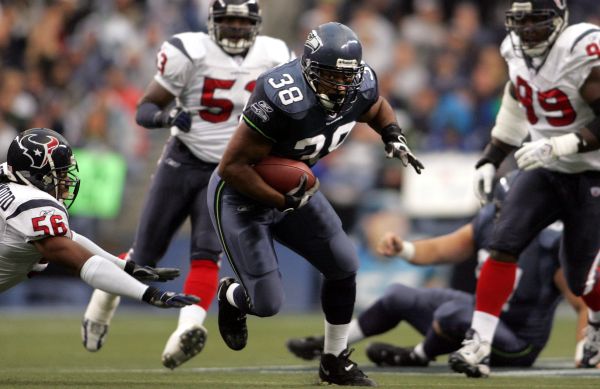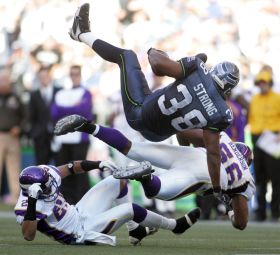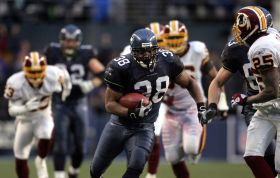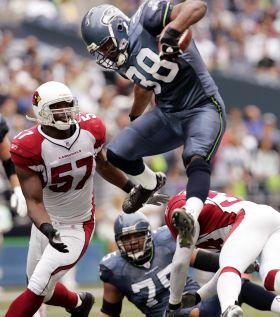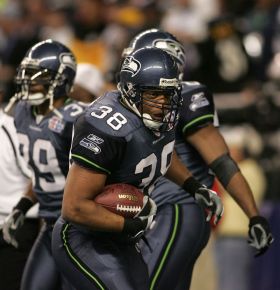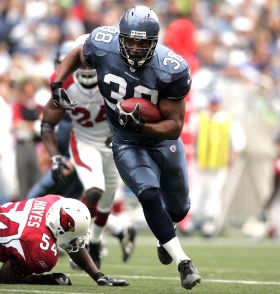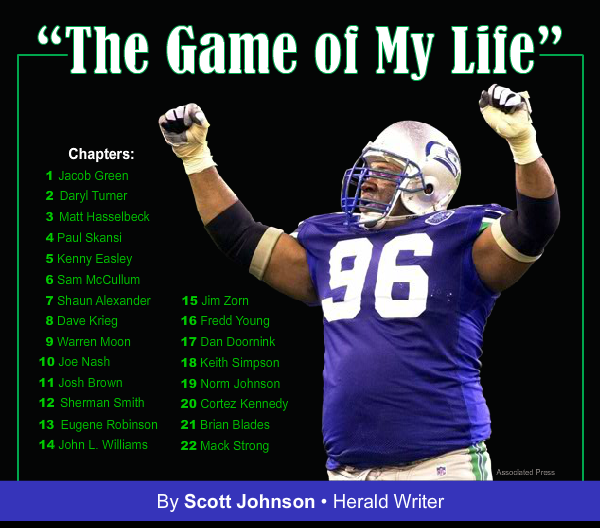While the first two major decisions of Mack Strong's athletic career were all about opportunity, the third one had everything to do with something entirely different.
"Spite," the Seattle Seahawks' longtime fullback said when asked why he chose to play in the Pacific Northwest way back in 1993.
Having been spurned by his hometown team, the Atlanta Falcons, in the 1993 NFL draft, Strong said no to a free-agent contract with that team and decided to go as far away as possible. So he landed in Seattle, a city he had never before visited. He hardly even knew anything about the Seahawks, other than a wide receiver named Steve Largent who recently retired and a young defensive stud named Cortez Kennedy whose name Strong had heard in passing.
Still, Strong was determined to make it work in his new home. Fifteen NFL seasons later, all of which were played with the Seahawks, Mack Strong not only made the most of his opportunity but became a fixture in the city he grew to love.
When people think of Seahawks football in the 21st Century, Strong's is one of the first names that come to mind. Hard-working, kind and overachieving, Mack Strong is everything the city of Seattle hopes to be.
Make no mistake about it: Mack Strong squeezed every ounce of ability out of his muscular frame. Despite his made-for-football name, Strong had to work hard just to play in the NFL at all. And the fact that he was able to stay there for so many years is a lesson to inspire anyone who's been told that he or she can't do something. Strong never liked to hear the word "can't," and so he simply went out and continually proved that he could.
In a sense, Mack Strong's future career was foreshadowed early in life, when he tried to mimic his military pilot grandfather by jumping off the tops of dressers around the family house. There were plenty of times when the activity resulted in Strong landing on his head. Years later, he would credit his hardened head to helping lead him toward a high-impact profession.
But despite his passion for contact, Strong was initially drawn more to the other kind of football than the one with the oval ball and shoulder pads. He was a star soccer player throughout his childhood, which eventually opened some doors for him in the academic world. The Brookstone School, a prestigious preparatory school in Columbus, Ga., expressed interest in the young soccer star and eventually offered him an academic scholarship to attend high school there. Having been impressed by the school's academic prowess and esteemed soccer program, Strong hit the books hard but also found time to enjoy athletics.
"A lot of my soccer buddies went to the school; that's how I was influenced to go there," Strong said. "But soon after I got there, I put the soccer shoes up and never put them back on."
[ Jennifer Buchanan · The Herald ]
The other kind of football, the one with the tackling and the helmet-to-helmet collisions, appealed to the teenaged Strong in a way soccer never could. His mother had forbidden him to play football while he was growing up, but she finally relented when he got to high school. And the new sport became a perfect fit. Strong became the starting running back for Brookstone's football team, and by the end of his career there he had rushed for more than 4,000 yards while falling just three touchdowns short of Heisman Trophy winner Herschel Walker's state record for career TDs. He was being recruited by teams all over the south, and naturally Strong opted to stay home and sign with the University of Georgia Bulldogs. The tradition of running backs at that school, which included the aforementioned Walker, led Strong to believe there was a real opportunity to make it to the NFL as a tailback.
The Bulldogs had a couple of older running backs named Tim Worley and Rodney Hampton, both future first-round picks, so Strong had trouble finding playing time as a freshman. By his sophomore season, the team added top recruit Garrison Hearst and a ballyhooed transfer from Long Beach State named Terrell Davis. If Strong hadn't done the math, his coaches did it for him. He was told he could either move to fullback and block for the others, or he could sit and watch them from the bench.
Strong became a full-time starter at fullback for his final two years at Georgia, earning the honor of offensive captain as a senior. His blocking helped Hearst get drafted in the first round, while Davis went on to become a late-round NFL success story who went on to win Super Bowl MVP honors. As their workmanlike bodyguard, Strong was all but overlooked at Georgia. Despite his quiet leadership, blue-collar work ethic and impressive blocking style, he went undrafted after his senior season. The Falcons told him they would select him, but they did not even call until the draft was over, and at that point they wanted him to sign as a free agent.
"I felt disrespected by that," Strong said. "I felt like they didn't draft me because they thought they could get me in free agency. I decided I was going to show them."
And so Strong signed with the Seahawks carrying only a garbage bag full of clothes. (He was so embarrassed to be traveling with such a modest tow that Strong waited for all the other passengers to clear out before retrieving his makeshift luggage from the baggage claim carousel.)
Upon arriving at the Seahawks' practice facility, Strong quickly realized how difficult it would be to "show" the Falcons that they had made any kind of draft-day mistake. The Seahawks already had four established veterans at running back, including a guy named John L. Williams who just happened to be the best fullback in franchise history. In all, there were nine running backs on the roster, and Strong often found himself running drills with the No. 4 offense.
"That was the first time in my football career that I thought that my days of football might be over," he later recalled. "For whatever reason, I had it in my mind that, if I didn't make the team, that would be it. I didn't want to be the guy who kept trying to make a team year after year, so I was going to give it up after that."
Thanks to a recently-added roster extension known as the practice squad, Strong stuck around even after the regular season began. While he didn't make the final 45-man roster, Strong practiced with the team all season and continued to open some eyes. Meanwhile Williams, a former Pro Bowler, struggled with injuries and moved on at season's end. Tracy Johnson took over as starter in 1994, while Strong was on the roster but inactive for the first eight games.
When Strong finally got his chance, midway through the 1994 season, he made the most of it. He scored the game-winning touchdown in a 22-21 victory over the Tampa Bay Buccaneers that November and made his first start the following week. He scored another touchdown two weeks later at Houston, giving Seattle a 16-0 lead that would eventually result in a 16-14 victory.
Along the way, Strong showed a willingness to block and open holes for others. His selfless style of play caused him to be overlooked by fans, but he was always appreciated in the locker room. And Strong eventually learned to see his position switch to fullback from tailback as a positive thing.
"In the end, it turned out exactly the way it was supposed to," Strong later said of the move he had made early in his career at Georgia. "I was good enough to be a high school tailback, but I didn't have the speed and agility to play in college.
"If I had played tailback and then switched roles when I got to the NFL, it would have been very dramatic. I'm glad I was able to make the transition when I did. I felt right at home at fullback in the NFL."
During that 1994 season, Strong also won over another person who would be important to his life. While dining at an Azteca restaurant near his Eastside apartment, Strong saw a breathtaking woman who caught his eye.
"I saw this beautiful waitress, put my smooth moves on her, and the rest was history," Strong later recalled with a laugh.
[ Jennifer Buchanan · The Herald ]
That waitress, who was moonlighting while working a primary job at Blue Shield Medical Group, would eventually become Mrs. Mack Strong. Mack and Zoe Strong quickly established themselves as fixtures in the community, hosting charity events while giving their time to causes throughout the Puget Sound.
On the field, Mack Strong continued to push himself to new levels. By 1996, he became the Seahawks' primary starter at fullback. He helped Chris Warren record back-to-back 800-yard rushing seasons before starting off an impressive string of 1,000-yard runners that lasted well into the next decade. Ricky Watters had three 1,000-yard seasons running behind Strong, while Shaun Alexander followed with five in a row.
Along the way, Strong nearly lost his starting job because of a coaching change. When Mike Holmgren arrived in 1999, the former Green Bay Packers coach didn't know much about how Strong had methodically kept pushing and pushing until he earned the starting job, nor about how Strong had become a steady influence within the Seahawks' locker room. All Holmgren knew was that Strong was struggling with injuries throughout the offseason workouts.
About the time Holmgren was hired, Strong underwent surgery on an ankle that had bothered him throughout the 1998 season. A second ankle surgery and kept him out of most of the summer minicamps. On the first day of training camp, Strong suffered a high ankle sprain. Without saying as much, Holmgren effectively moved on by turning to Reggie Brown as the team's fullback.
But in typical Strong fashion, he continued to fight until he got his starting job back. And he won over Holmgren in the process. Soon thereafter, the new coach identified Strong not only as a key to offensive success but also as a veteran leader that could bring the best out in his teammates.
Even when the Seahawks used draft picks on fullbacks to replace the aging Strong – third-round pick Heath Evans of Auburn in 2001, and fifth-round pick Chris Davis of Syracuse in 2003 and sixth-round pick Tony Jackson in 2005 – the never-say-die fullback kept plugging along.
But the physical game was taking its toll. Strong was also growing frustrated by the Seahawks' mediocre records, which hovered between 6-10 and 9-7 every season between 1993 and 2002. And so he started thinking about retirement. Even when the Seahawks returned to the playoffs after the 2003 season, he gave serious thought to his future. He mulled it over again after 2004.
In the end, he decided to keep on pushing. And it turned out to be worth the effort. The Seahawks had a breakout year in 2005, a season that also saw Strong go to his first Pro Bowl. Thanks in part to Alexander, Strong had slowly started getting the national attention he deserved. Alexander continually praised his older teammate for not only his blocking but also for his guidance. The two became close friends, and Alexander mentioned Strong's name just about every time a reporter asked him about his key to success.
After flying to Hawaii on Alexander's dime as a Pro Bowl alternate in February 2005, Strong made it on his own merits the following year. Alexander's 1,880-yard, 27-touchdown season in 2005 helped Strong earn his first Pro Bowl invitation.
[ Jennifer Buchanan · The Herald ]
But before he could go across the Pacific to play in that game, Strong had a few playoff games in which to participate. The Seahawks had not won a single postseason game during his first 12 years with the team, and yet the 2005 playoffs looked promising. They had a franchise-best 13-3 record that year, winning 11 consecutive games at one point. That winning streak came after a Week 4 overtime loss to the Washington Redskins, which left Seattle staring at a 2-2 record.
"We felt like that (loss to Washington) was a game we should have won, and we vowed to win those (kinds of) games the next time," Strong said. "For whatever reason, we made up our mind that we were going to win the close ones. And it happened for us.
"We got very lucky with keeping people healthy, and the guys that had to come in and play played well, and we just kept on winning."
After several years of .500 football, the Seattle Seahawks finally got over the hump.
"That was probably only year in my whole career that I've ever lived in the moment as far as a season was concerned," Strong said. "That season, it was really one of those things where you took it one game at a time and tried to enjoy every moment.
"We were playing as consistent and as well as any team could. We won 11 games in a row, and that just doesn't happen in this league."
Strong could appreciate that season with a different perspective than any of his younger teammates. As a 34-year-old, former free agent who had played in just three postseason games during his career, Strong knew that going to the Super Bowl could be a once-in-a-lifetime experience, and so when the Seahawks beat the Redskins and Carolina Panthers to earn a trip to the first Super Bowl in franchise history, he made sure to enjoy the ride. For Mack Strong, regardless of how the game turned out, Super Bowl XL was the biggest game of his life.
Seahawks vs. SteelersFebruary 5, 2006 - Super Bowl XL
as told by Mack StrongIt goes without saying that the Super Bowl is what stands out as the greatest game I've ever played in. It's always the most-watched game on television, and it was the first time in history for this organization, and for the city of Seattle, to be in the Super Bowl. And to be a part of that is a tremendous feeling.
During the week leading up to the game, it was very surreal. We were in Detroit, and whatever teams go to the Super Bowl really get a first-class perspective from the time they get there. We got there on Sunday, and they blocked off the entire freeway for us. There was a 30- to 40-car police escort, helicopters overhead. It was one of those feelings you never forget.
That whole week in the hotel, and all around town, there was just a buzz around the game. You're seeing different movie stars and radio personalities around the city before the game. I remember seeing this actor, Doug Savant from "Desperate Housewives," on an elevator. I recognized him, and he must have recognized me too. He congratulated me on a great season. He knew that was the year I made it to my first Pro Bowl, so he just told me how deserving I was of it. That shows that you're really playing in a big game. That's not something, at least for me, that I really expected. It makes you feel really good about going through all challenges and the hardships out here in Seattle leading up to that moment.
On the Tuesday of that week, there were 2,000 media representatives from all around the country, and they're all there to ask you questions about your life. With everything leading up to game, it really is one of those times when you want to let everything soak in. There are a lot of memories that I'll have with me the rest of my life.
It was unique for me in a couple different ways, the main one being that I was the guy with the longest tenure on the team. I was able to have a perspective about the tough years. Coach Holmgren was my third coach, and we'd been through all these years where at the beginning of the season, everybody had the desire to make it to Super Bowl, but that was not a reality and we were dealing with a lot of disappointment. To actually reach that pinnacle point of your career just felt very rewarding, especially after all those years of coming up short.
There were definitely years before that particular one when I thought about retiring and going on to other things, and I was glad at that particular moment that I didn't.
Once we got out on the field, it felt very much like any other game. Obviously, it was the Super Bowl, but we tried to approach it like it was just another game. It was pretty much the same routine we normally had for a night game. Guys were eating the same meals, riding on the bus at the same time, trying to stay relaxed in the locker room by listening to music. I got up that morning, and read my Bible first thing in the morning, like I usually do. I prayed with a lot of my friends, guys affiliated with the church I go to. I talked to them a lot on the phone that day, trying to get encouragement and inspiration. I talked to my wife. Those are things I normally do. I eat the same meal, a steak. I'm always on first bus; I like to get there nice and early and stretch out two or three times before the pre-game warmups. So I pretty much kept the same routine. I like to listen to inspirational music, whether it's R&B or spiritual music, gospel music. I listen to that all the time because I feel like I have to make sure my spirit is really calm before the game.
When we got on the field, guys were talking it up, as usual. More than anything else, they were really talking about this being the last game of the season and an opportunity to end it the way we wanted to. We were hammering on that a lot. To 'lay it all on line for all 60 minutes' is kind of a war cry for most NFL teams week in and week out. It's: 'Sixty minutes. If we can get it done for 60 more minutes, we'll be all right.' But that particular game, it was the last time that we would hear that slogan: 'You've got 60 minutes, lay it all on the line.' And this time, we had a chance to come away champions.
Offensively, we definitely had a mindset that we wanted to make the game really physical, and we wanted to do what we did all year long. We didn't care where the ball was, whether we had 90 yards to go or 95 yards or whatever it was, we still felt like we had to get a touchdown get it done. That first drive, everyone was feeding off the energy. It was very surreal. We were moving the ball, not trying to do too much. We were trying to play it one play at a time and play within the game; everybody was doing their job. We felt very much like we were clicking. Everybody, especially on that first drive, felt really confident. It was like, 'OK, this is the way we planned for it to be, to move the ball down the field.' We got a couple quick first downs on our first drive, but then a sack ended that. We got to midfield on our next drive before a holding call forced us to punt. But we were moving the ball on them.
At some point, I don't remember when this was, you could see signs of wear and tear on their part. It seemed like some of their guys were breathing hard. They had their heads down, their feet crossed and their hands on their hips. Those are signs of fatigue. And I think all of us felt pretty fresh. We had had a pretty good playoff run. So at least to me, I felt at that time like this was the time when we really had to step on the gas. It's unfortunate that we had some miscues, because we could have really put them away early.
The individual plays are kind of vague, and I'm glad about that. I remember a push-off penalty when receiver Darrell Jackson caught a touchdown pass and it was called back because of pass interference. We had to settle for a field goal. We were only ahead 3-0, but in a way it felt like more. And then we had an open pass over the middle that would've given us a first down, but the receiver, tight end Jerramy Stevens, dropped it.
There were a couple plays like that on offense. Those were the things that took the wind out of our sails a little bit early on. We really prided ourselves all year on who was going to make a play, and it seemed like someone always did when we needed one -- whether it was Shaun Alexander or Matt Hasselbeck or Darrell or D.J. Hackett or Jerramy Stevens. It was always somebody. Somebody always made a play when we needed it. And for some reason, that just didn't happen in that game. That's what sticks out.
So they get a late touchdown and it's 7-3 at halftime. We really felt like we were in control of the game, but we were still trailing. As we walked out of the locker room for the second half, one of the last things I remember hearing, and I don't remember who said it, was: 'When we come back in here, let's not have any regrets. No regrets.' That stuck with me. Not only that particular game, but it really resonated with me the whole year afterward. I didn't want to have any regrets. Especially for a guy like me who had played double-digit years in the league, you never know what season is going to be your last, or what play is going to be your last. So the idea of playing a game to the point that you might have some regrets at the end, that really meant a lot to me.
Then on the second play of the third quarter, Pittsburgh scored another touchdown when running back Willie Parker broke a 75-yard run. That was definitely a big blow. Our defense did a superb job, with the exception of two or three plays – unfortunately, those were plays that they scored on. But otherwise they did a great job of holding them. After Parker's run, I felt like it was either now or never. If we didn't make a play and respond to that long touchdown, I didn't know whether we would recover. That was something that definitely stuck out. I felt like we needed to answer that charge they made, and unfortunately we never put it together.
They ended up winning the game 21-10. As soon as game was over, even as I sat and watched the final seconds tick off the clock, I had already made a decision that I was definitely going to come back and play another season. My desire was to come back, get back to that game and have a different feeling at the end of it. I remember that very clearly as I was walking off the field. That's something that will stick out for me forever, that disappointment. We had an incredible opportunity, and we had two weeks to think about it. But somebody's got to win, and somebody's got to lose, and unfortunately that was us.
I felt like we had nothing to be ashamed of. To a man, we all left it out on the field and could have no regrets about it. I have some resolve about that. There were no regrets. I gave it my best. I tried to do my best, I tried to do everything I could, and it just wasn't good enough. And I could live with that. What I wouldn't have been able to live with was if I felt like I hadn't given my best. But I looked at it like: Hey, I gave it my best, and hopefully we'll get a shot at this again.
In the days after the game, you heard a lot about some of the calls that were made by the officials. I did look at the calls later, and I know people made a lot of comments about that, but in game like that you don't ever want to let that be a remote possibility that that's an issue. I felt like the plays were there for us to make. If we would have made the plays, we would have won game. In spite of what people saw as bad calls, or said were bad calls, in spite of all that was said, if we had made plays, we could have won the football game. It's that simple. To be athlete in this profession, that's they way you have to look at. You have to be introspective instead of looking for someone else to blame. I felt very strongly about that.
My big thing afterward was to look ahead. I was 34 years old, but there was no doubt I was going to come back for at least one more year. To put it in perspective, you have to understand where I came from. My first year in the league, we were 6-10. My second year in the league, we were 6-10. The next four years, we were right around .500. And after that, it was more of the same -- 7-9, 8-8, maybe 9-7, even when Coach Holmgren came around. So up until that point, that was my experience playing for the Seahawks. We were either really bad or just mediocre.
So to be a part of a great team that made it to the Super Bowl, I'd been waiting a long time for that. I felt healthy, and I felt like had lot of football left in me and could help the team win. So I was more convinced than ever that I was coming back.
Strong came back for not just one year but for two years, although he never did make it back to the Super Bowl. In those final seasons, his career came full circle.
After a 2006 season that saw the Seahawks go back to the playoffs but fall one game short of the NFC Championship game, Strong thought back to his first training camp. He remembered watching an aging defensive lineman named Joe Nash who just refused to let the game pass him by. Strong was impressed that Nash kept playing at a high level not only in 1993, but also for three more years. By the time he retired, Nash had played a franchise-record 15 seasons with the Seahawks.
"That was a mystery to me. I didn't understand that," Strong said years later. "At the time, I was like: anybody who plays five years or more in this league, I don't how in the world they do that – let alone 14 or 15 years. That just seemed impossible to me. So he was definitely one of those guys who really stood out."
In 2007, Strong suited up for his 15th season with the Seahawks to match Nash's career record. While no one could have expected that he might make it past Year 5, Strong just kept pushing and pushing until the 15-year pounding finally took its toll.
On an ordinary Sunday in October 2007, Strong woke up before a game against the Steelers – the Seahawks' first shot at Pittsburgh since the Super Bowl loss – and felt a tingling sensation in his left hand. Strong had felt similar sensations during his remarkably long career, but somehow he felt like this might be different.
Rather than acknowledge the sensation, Strong did what he had done for most of his adult life. He pushed on. The tingling got worse after his first collision of the game, and a few minutes later, during a routine pass block against Steelers linebacker James Harrison, Strong felt his whole body go numb. He knew something was wrong, and he had a bad feeling that the improbable run might be over.
Strong had seen his last play on a football field. He was later diagnosed with a herniated disc in his spinal cord, an injury that put him in danger of paralysis if he continued to play. The next day, during a press conference with local reporters, Strong unexpectedly announced his retirement before breaking down in tears.
"There's a lot more to life than football," Strong told reporters on Oct. 8, 2007. "I've got a wife and two kids, and there's nothing more important than being able to spend time with them. If I hadn't been able to walk off that field ...
"I'm just glad that I was able to make that decision."
During his 15 years with the Seahawks, Strong suited up alongside 350 teammates. Of course, only one was a Super Bowl.
"That's the pinnacle of your profession," he said. "All of us, however many guys -- 1,.500 or 1,800 -- dream about standing up on that podium holding that Lombardi Trophy every summer. Even though we never got a chance to hold up that trophy, the fact that I got there was a huge accomplishment.
"I'm just a regular guy from a small town in Georgia. I never thought I would be playing in the most-watched game in the world, and yet I did. That's something I'll pass on to my kids: to really set your goals high. You never know what you might accomplish. You never know how life might turn out. Reach for the stars."
That, in a nutshell is the legacy that Mack Strong will leave behind. He pushed himself year after year after year and finally earned his just reward. Along the way, he gained a reputation as a determined warrior who bored his way into the hearts of Seattle football fans. While he rarely carried the ball, scored only a handful of rushing touchdowns, and made it to only one Pro Bowl, Mack Strong will always be considered one of the favorite Seahawks of all-time.
Whether it was Tracy Johnson or Reggie Brown or Heath Evans or Chris Davis or Tony Jackson, the other fullbacks all fell by the wayside while Strong kept the starting job.
"I think people will remember me as a guy who really tried to persevere," Strong said. "But that's life.
"My career is not how I would have mapped it out. But I can look back on it now and say I wouldn't have changed a thing. It helped me be a better person. It helped me learn a lot of lessons. It really says something about what can happen when you persevere."
At his final press conference as a Seattle Seahawk, Strong was asked why he never succumbed to the pain. His response could have been summed up in two words.
That's life.
"Life is not easy, no matter what you're doing -- whether you're playing fullback for the Seattle Seahawks or working a 9-to-5 job stocking groceries," Strong said in October 2007. "There's a certain amount of pain involved in order to reach our goals and destiny in life, and a long time ago I decided I was willing to pay that price."
And for Mack Strong, it was worth every penny.

